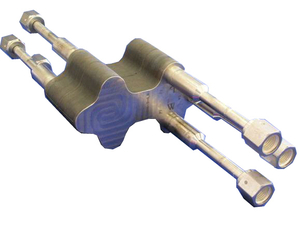Reforming of methane, ethanol and higher hydrocarbons
- contact: Dr. Peter Pfeifer
- funding: Helmholtz-Programmforschung
The significant drawback of the energy carrier hydrogen is the missing distribution infrastructure and its relatively low volumetric energy density. Instead of the direct transition to a hydrogen economy (including a H2 infrastructure and use) or the longterm perspective of using BTL fuels (biomass to liquid), the decentral or mobile reforming of hydrocarbons can be an alternative for hydrogen generation.
In general, steam reforming of methane or bio-ethanol generates the highest H2 yields in relation to the utilized fuel. According to the endothermic character of this reaction, energy in form of heat has to be supplied. The heat can be supplied by combustion of fuel cell anode off gases, which still contains significant amounts of hydrogen. Furthermore, fast heating-up of the reactor system and rapid responses to load changes need to be realized.
These challenges for high heating rates and dynamic behaviour can be met more easily by microstructured reactors (due to their very fast heat transfer rates) than by conventional reactors.
In the field of steam reforming applications, the institute works on the direct coupling of endothermic reforming with exothermic combustion reactions. The kinetics of both reactions has to be adjusted to each other for this direct coupling, because the combustion reaction possesses faster kinetics than the reforming reaction. The adjustment can be realized e.g. by sequential feeding of the fuel gas into the combustion part of reactor. This work is connected to selective CO oxidation studies.
 Micro reactor for hydrogen generation by thermal coupling of exothermic combustion with steam reforming of diesel fuel
Micro reactor for hydrogen generation by thermal coupling of exothermic combustion with steam reforming of diesel fuel Test reactor for the investigation of catalyst coatings and catalyst powder on or in microstructres (at 750 °C)
Test reactor for the investigation of catalyst coatings and catalyst powder on or in microstructres (at 750 °C)